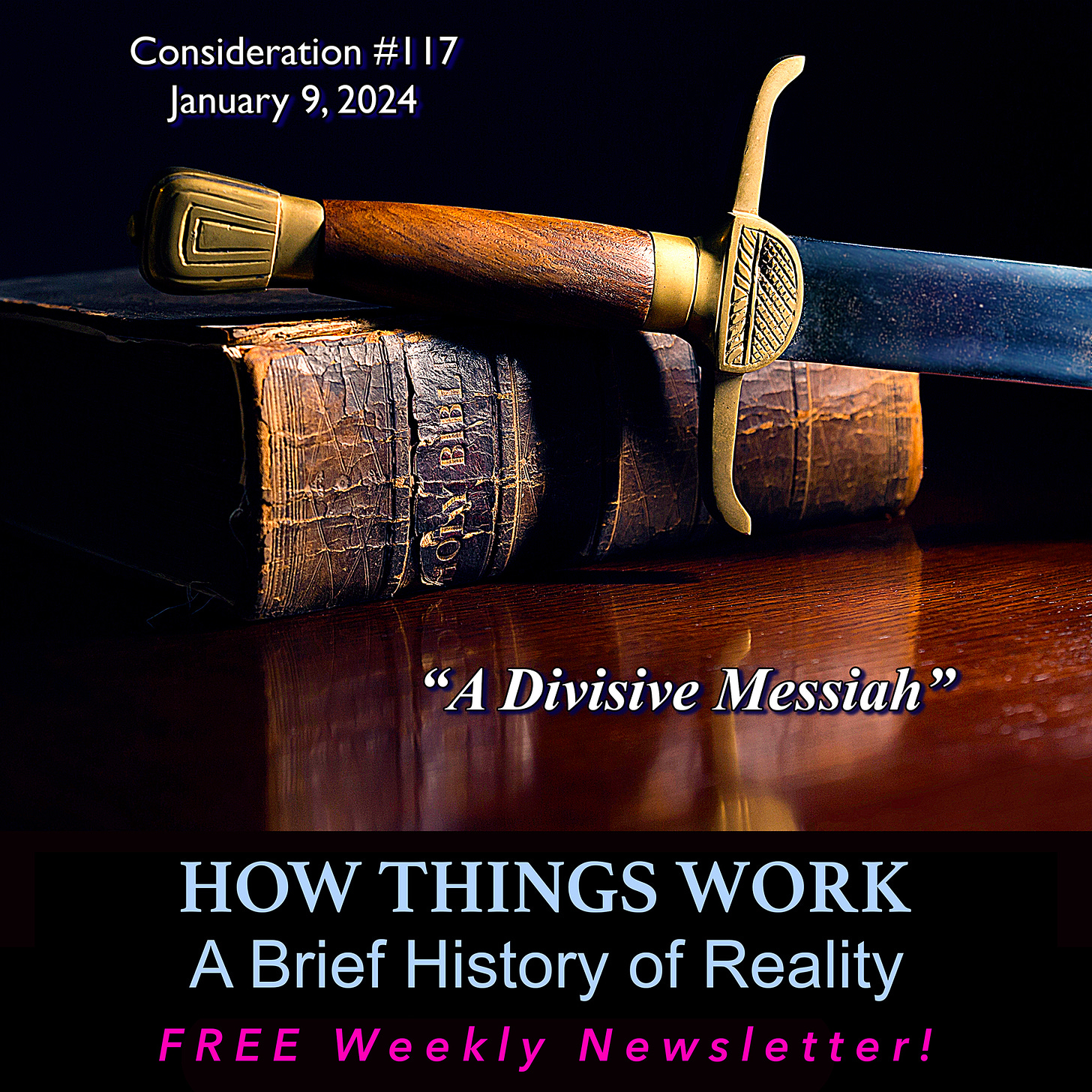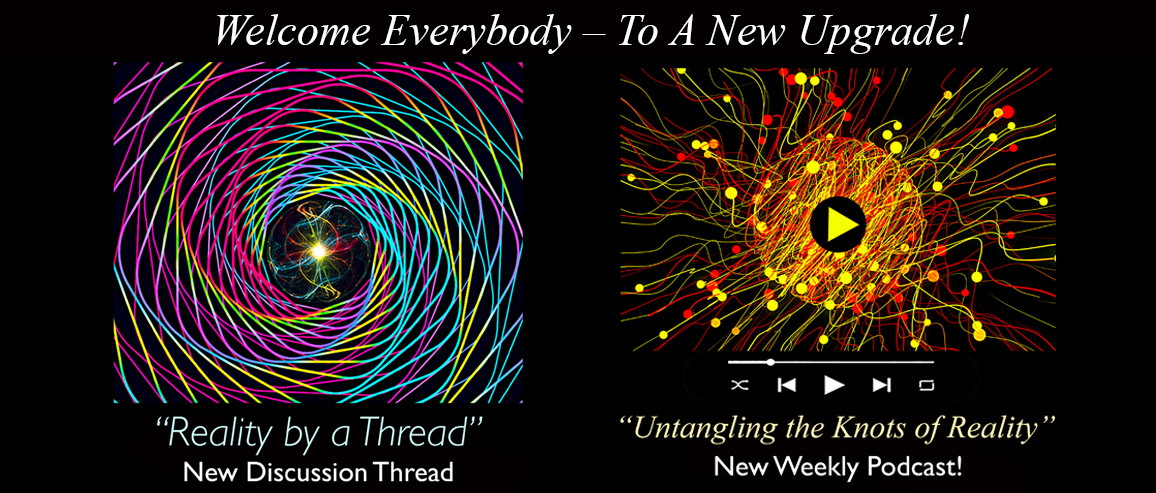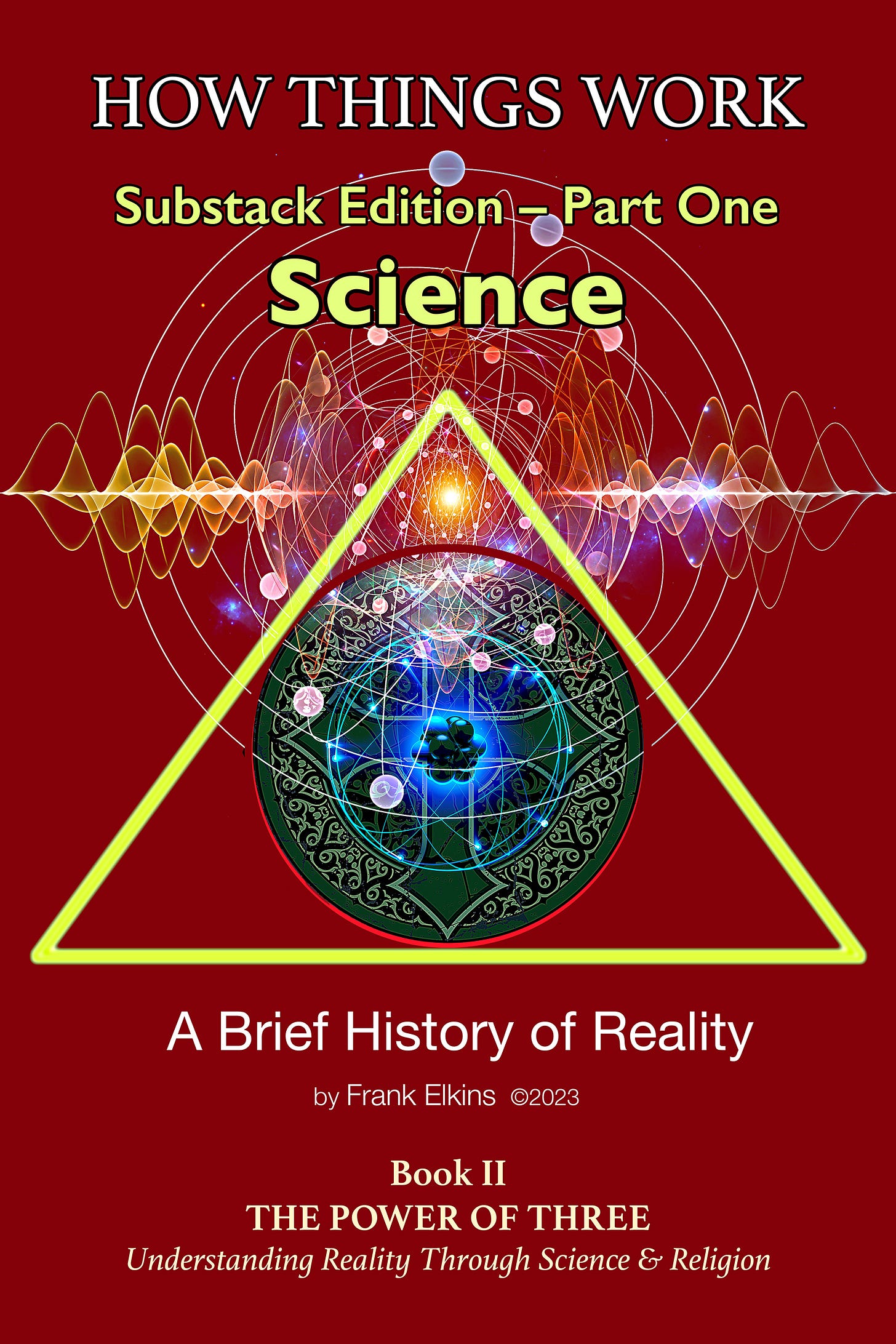A Divisive Messiah
How Things Work – Consideration #117 (Book II Science & Religion)
Be A Part of the Conversation!
Tuesday January 9, 2024
“Do not think that I have come to bring peace to the earth. I have not come to bring peace, but a sword.”
Jesus – Matthew 10:34
PREFACE
Welcome Everybody!
Jesus lived in a time of religious and political unrest. He realized the risks in attempting to challenge the “powers that be” and the certain danger that it involved. Jesus was keenly aware that his message would divide people, and that not everyone would be happy with the “good news” he offered them. Ultimately, Jesus was a divisive Messiah.
Jesus makes a clear distinction between “the world” and the “Kingdom of Heaven.” The world is concerned with inconsequential things such as race, religion, wealth, titles, and personal gratification, whereas the Kingdom of Heaven reflects a greater understanding and appreciation for an experience of reality not possible in the empirical world. Jesus knows that the possibility of a “new” experience of reality will cause division.
In John 15:19, Jesus defines the nature of this division:
“If you belonged to the world,
the world would love you as its own.
But you do not belong to the world
because I have chosen you out of the world, and therefore the world hates you.”John 15:19
Jesus advises the Apostles that it is a dangerous world. Although they may face innumerable trials and tribulations, he urges them to be cautious and prepared, but not fearful. Have faith, and you become an instrument of God. Stay faithful, and you help implement God’s will on earth. For Jesus, nothing was more important or consequential than that.
“I am sending you out like sheep among wolves. Therefore be as shrewd as snakes and as innocent as doves. Be on your guard; you will be handed over to the local councils and be flogged in the synagogues. On my account you will be brought before governors and kings as witnesses to them and to the Gentiles. But when they arrest you, do not worry about what to say or how to say it. At that time you will be given what to say, for it will not be you speaking, but the Spirit of your Father speaking through you…
So do not be afraid of them, for there is nothing concealed that will not be disclosed, or hidden that will not be made known. What I tell you in the dark, speak in the daylight; what is whispered in your ear, proclaim from the roofs. Do not be afraid of those who kill the body but cannot kill the soul. Rather, be afraid of the One who can destroy both soul and body in hell…
Whoever acknowledges me before others, I will also acknowledge before my Father in heaven. But whoever disowns me before others, I will disown before my Father in heaven.”
Matthew 10:11-33
CONSIDERATION #117 – A DIVISIVE MESSIAH
What Jesus says next is one of the most controversial, yet absolutely accurate, statements in the New Testament. Jesus does, in fact, divide Judaism, and Christians will soon be facing lions in the stadiums of Rome. Brutal Holy wars would be fought in the name of Christianity. And the war between the sons of light and the sons of darkness would playout in the world of mankind.
Who were the hypocrites, and who were the pure of heart, would be determined by God based on their acceptance or rejection of the word.
“Do not suppose that I have come to bring peace to the earth. I did not come to bring peace, but a sword. For I have come to turn a man against his father, a daughter against her mother, a daughter-in-law against her mother-in-law – a man’s enemies will be the members of his own household.”
Matthew 10:34-36
Essentially, Jesus has come into the world to offer a choice: choice necessitates division. Some will choose to accept his invitation to the “Kingdom of Heaven”; however, others will choose to remain in “the world.” Jesus suggests that “the world” is the division that separates “mankind” from God.
“…you cannot be ‘of the world’ and ‘in the Kingdom of Heaven’ at the same time.”
As recorded and expressed in the New Testament Gospels, choosing Jesus and the Kingdom of Heaven is choosing to see reality as God does; choosing “the world” is a choice to continue seeing the world as human beings do. And it is an all or nothing proposition; you cannot be “of the world” and “in the Kingdom of Heaven” at the same time. You must be willing to give up “the world.”
“Anyone who loves their father or mother more than me is not worthy of me; anyone who loves their son or daughter more than me is not worthy of me. Whoever does not take up their cross and follow me is not worthy of me. Whoever finds their life will lose it, and whoever loses their life for my sake will find it.”
Matthew 10:37-39
Here, Jesus’ reference to “himself” is really not a “personal” reference; he is simply a pure reflection of God’s love; a pure reflection of ultimate truth. Being in the Kingdom of Heaven means that you are also a pure reflection of God’s love and God’s truth. Replace the direct reference to Jesus with “truth” and you can begin to understand what is being said:
PARAPHRASED VERSE: Anyone who loves their father or mother more than truth is not worthy of truth; anyone who loves their son or daughter more than truth is not worthy of truth. Whoever does not take up their cross and follow truth is not worthy of truth. Whoever finds their life will lose it, and whoever loses their life for the truth’s sake will find it.
Now replace the word “truth” with the word “reality.”
RE-PARAPHRASED VERSE: Anyone who loves their father or mother more than reality itself is not worthy of reality; anyone who loves their son or daughter more than reality is not worthy of reality. Whoever does not take up their cross and accept reality is not worthy of reality. Whoever finds their life will lose it, and whoever loses their life for reality’s sake will find it.
All citizens in the Kingdom of Heaven are equal because they are all equal expressions of God’s love and truth. They express the innocence and acceptance of children as opposed to the maligned depravity of adults. Children, like the disciples of Jesus and “the word,” were not dominated by this depravity.
God’s love is God’s love, no matter who is expressing it; that is the unifying factor in Jesus’ message. In the Kingdom of Heaven, you and Jesus are one and the same. Meaning you and God are one and the same.
“Anyone who welcomes you welcomes me, and anyone who welcomes me welcomes the one who sent me. Whoever welcomes a prophet as a prophet will receive a prophet’s reward, and whoever welcomes a righteous person as a righteous person will receive a righteous person’s reward. And if anyone gives even a cup of cold water to one of these little ones who is my disciple, truly I tell you, that person will certainly not lose their reward.”
Matthew 10:34-42
Here, Jesus proposes that “love” given or applied to anyone representing him, is love given and applied directly to him, and therefore, God. In addition, recognizing the truth, or reality, of other people and treating people for who they really are will be rewarded. A title or high position counts as nothing unless they are pure in heart. Finally, Jesus shows a unique affinity and appreciation for children throughout the Gospels, as he does again here, stating that treating children well is a true sign of Righteousness.
These ideas are radically reflected in Mark when Jesus curses a fig tree because it yields no fruit for him, even though it is not the season for figs.
“Jesus was hungry. Seeing in the distance a fig tree in leaf, he went to find out if it had any fruit. When he reached it, he found nothing but leaves, because it was not the season for figs. Then he said to the tree, ‘May no one ever eat fruit from you again.’ And his disciples heard him say it…”
Mark 11:12-14
“In the morning, as they went along, they saw the fig tree withered from the roots. Peter remembered and said to Jesus, ‘Rabbi, look! The fig tree you cursed has withered!’”
Mark 11:20-21
This seemingly strange story reveals a subtle understanding related to Jesus’ teaching; in the Kingdom of Heaven the fig tree would have yielded him fruit regardless of season. What this specifically means is debatable. However, it is a clear indication that those who choose “the world” over the “Kingdom of Heaven” are ultimately doomed.
In terms of “the world” and the “Kingdom of Heaven,” you cannot have your cake and eat it too; you must choose one or the other. Even fig trees have to make a choice! It is not that Jesus seeks revenge on those who reject his message; it is simply a consequence of their individual choice.
“Not everyone who says to me, ‘Lord, Lord,’ will enter the kingdom of heaven, but the one who does the will of my Father who is in heaven.”
Matthew 7:21
Jesus sees “the world” as a world imprisoned by violence and violent people:
“From the days of John the Baptist until now the kingdom of heaven has suffered violence, and the violent take it by force.”
Matthew 11:12
Jesus cautions his disciples about the violent nature of “the world,” and the anger and violent reaction that would occur over their proclamation of the “good news.”
“Do not be surprised, brothers, that the world hates you.”
John 3:13
“Blessed are you when people hate you and when they exclude you and revile you and spurn your name as evil, on account of the Son of Man!”
Luke 6:22
“I have said these things to you, that in me you may have peace. In the world you will have tribulation. But take heart; I have overcome the world.”
John 16:33
The violence of “the world” is also reflected in the apostles’ lives and deaths. Many, were crucified, some, like Peter, were reportedly crucified “upside-down.” Bartholomew was said to have been skinned alive before his crucifixion. James, Paul, and others were beheaded.
“Having the title of ‘High Priest,’ or ‘Pope,’ does not necessarily mean that someone understands or speaks the ‘truth’ or ‘reality of God…”
Christianity itself would become an expression of this violence through the Roman Catholic Churches’ Inquisitions and Holy wars; ironically reflecting the same abuse and corruption of spiritual power and authority yielded by the Jewish power authority that Jesus called hypocrites and “a brood of vipers” in the gospels. One connotation of this phrase is “sons of Satan.”
According to Jesus, having titles such as “High Priest,” or “Pope,” did not necessarily mean that someone understood or spoke the “truth” or “reality” of God; these were simply “worldly” titles with no significance in the Kingdom of Heaven. Emphasizing that people are not their titles; they are a true reflection of their hearts and being. Again establishing the objective nature of “the world” as opposed to the spiritual nature of the “Kingdom of Heaven.”
Jesus argues that violence is the natural consequence of “being in the world,” whereas peace, and an understanding of reality that “surpasses all knowledge,” is the natural consequence of “being” in the “Kingdom of Heaven.” One is an empirical experience; the other is a rational experience.
“…understanding manifests love, and love manifests peace through unity in the one truth…”
In the empirical world choice manifests fear, which manifests hate, which manifests violence. However, in the “Kingdom of Heaven,” understanding manifests love, and love manifests peace through unity in the “one truth,” manifested as the Ultimate Realty of Mind or Spirit: The Kingdom of God, or The Kingdom of Heaven.
The Garden of Eden before the fall of “mankind.”
POSTSCRIPT
Although many see these examples as unusual in the Jesus narrative, it makes perfect sense given what was about to transpire. Soon, Jesus would be portrayed not as a loving prophet of God, or the gentle shepherd of Israel, but as a heretical blasphemer of God and the Jewish tradition.
“Inevitably, the violence of the world directly assaults Jesus…”
The once supportive and calming words of the Sermon on the Mount would be replaced with fear and apprehension by those supporting the man who had spoken them. Soon, it would become dangerous to even know Jesus.
Eventually, and perhaps inevitably, the violence of the world directly assaults Jesus with one of most cruel, ruthless, inhuman forms of torture and execution ever devised by human beings: crucifixion. A natural reflection and expression of “the world’s” interpretation of reality.
Next week Jesus travels to Jerusalem and offers the Kingdom of Heaven to “the world” and the leaders of “the world” choose to violently reject it…
This Week on “The Thread”…
Excerpt From This Week’s Podcast…
Expand the Conversation by Upgrading to “Reality by a Thread!”
• UNTANGLING THE KNOTS OF REALITY: Podcast #77 – “Untangling the Modern Atom”
(“How did Earnest Rutherford’s gold foil experiments change our perception of the atom?” “What was the main problem with the planetary model of the atom?” “How did atomic theory shift the focus of science away from empiricism and toward rationalism?” “Why does Rutherford’s model of the atom represent the final gasp of traditional science and classical physics?” “How did the atom separate reality into a reality of the very large and a reality of the very small?” These are some of the knots we will attempt to untangle in this week’s podcast. That’s a lot of “science stuff” for one podcast! So, let’s get started…)
• REALITY BY A THREAD: New Testament Artificial Intelligence (John Locke) – “A New Testament moral reference reflects a recognition and evolution of Old Testament morality from a focus on authority and law to focus on morality itself. It represents the acceptance of personal responsibility over the unquestionable authority of a God or Leviathan; because this kind of authority is not needed if individuals voluntarily and consciously accept the responsibility of morality themselves. A New Testament approach to morality involves recognizing and understanding the rational essence of morality as opposed to simply developing an empirical structure for strictly maintaining morality.”
•FREE PDF Downloads of Book IV: “The Cosmic Symphony – Overtones of String Theory” plus other Free Books, Discounts and Benefits. Also Gain Complete Access to all Previous Podcasts and Threads!
UPGRADE NOW!
Book V Now Available!
“Quantum level thinking embraces the world of probability over physicality. It refocuses Awareness and Consciousness beyond the empirical world of Physical Reality to a totally abstract world of Quantum Possibility…” (Book V – Quantum Consciousness)
Click Image to Learn More!
Book V considers the questions related to what Consciousness is, how it evolves through levels of Perception and Awareness, why each step in the process is important, where we are currently on the “Arch of Consciousness,” and how all of this connects to Artificial Intelligence. (166 pages)
The Second Substack Edition is Now Available!
Einstein said time is an illusion. Ever wonder why?
If you have ever wanted a Deeper Knowledge of Science, wished you could Understand Einstein, or are curious to Know What Quantum Mechanics Is All About without needing a degree in Math or Science this book is for you! (224 pages)
Click Image to Learn More!
“Western civilization revolves around three fundamental abstractions: Reason, Mathematics, and Logic.” (Book II - Part I: SCIENCE – Substack Edition)







